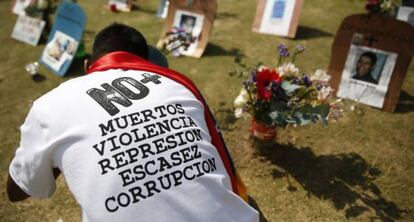Venezuela is the second most dangerous country in the world
NGO reports an estimated 24,980 homicides in 2014, 68 each day

With an estimated 82 murders per 100,000 residents, Venezuela holds the second highest homicide rate in the world for 2014, falling just behind Honduras. The reports came from Observatorio Venezolano de la Violencia (OVV), a Venezuelan NGO that presented its findings in Caracas on Monday.
The organization reports 24,980 homicides in the nation of 30 million, 68 murders each day. The NGO came to its conclusions using mathematical models for projections made from several years’ worth of official reports obtained through unofficial channels and by following up on news reports and firsthand accounts. Sociologist Roberto Briceño-León, the director of the organization, tells EL PAÍS by telephone that his data on the number of homicides could have a 5-10 percent margin of error. In light of foreseeable government criticism, he says: “The best way for the government to prove our numbers are wrong is by opening up its official archives.” Since 2004, the regime has forbidden the police and other federal institutions from sharing statistics on violent death rates and crime.
The country has an estimated rate of 82 murders per 100,000 residents
The research, already alarming as it is, represents a 4 percent increase compared to 2013, when the organization estimated the homicide rate to be 79 per 100,000 residents or a total of 24,763. The rise in violence is obvious in everyday life; crime has become commonplace. A virtual curfew has been imposed on cities where public life is reduced to a minimum.
The government has dodged to the issue for years despite the fact that most of the murders take place in poor areas of the cities, bastions of chavista voters. The increasing crime rate precedes the Bolivarian Revolution but it has grown exponentially in the last 15 years, threatening to refute official statistics on social advances. Hugo Chávez only referred to the problem on very few occasions toward the end of his life. His ex-director of intelligence and recently ousted interior minister, General Miguel Rodríguez Torres, even said that the public’s concerns about crime was the result of a “feeling of insecurity” stirred up by media outlets that are conspiring with the opposition.
But reality keeps trying to prove him wrong. On Friday, the government inaugurated a new morgue in Caracas to replace the old facility, which was always full. In December alone, 364 bodies of people who had died violent deaths ended up at that morgue.
The data shows a 4 percent
According to Freddy Bernal, head of the presidential commission for police reform, 250 officers were murdered in 2014. He shared this information on his Twitter account, adding that 130 were killed in Caracas alone. “And when the crooks kill police officers, the police goes out to kill the delinquents,” OVV director Briceño-León says. “In 2014, there were more than 3,000 reported deaths in situations where individuals resisted police authority. It’s a significant number that shows that police officers do not have faith in the justice system in Venezuela either.”
Briceño-León emphasized that, contrary to the government’s official story, it is not poverty or social exclusion that promotes murder. “Impunity, the destruction of the institutions and the breakdown of the social contract that regulated the coexistence of citizens” are the catalysts of homicide, Briceño-León says. If not, then “how can we explain that during the years of highest oil revenues in Venezuelan history and just when - according to official data - the government has reduced social inequality, we are experiencing the greatest upturn in homicide rates?,” the researcher asks.
Briceño-León also fears that the economic crisis that began in 2014 and which promises to worsen in 2015 will lead to an increase in what he calls “amateur crimes.”
Translation: Dyane Jean François
Tu suscripción se está usando en otro dispositivo
¿Quieres añadir otro usuario a tu suscripción?
Si continúas leyendo en este dispositivo, no se podrá leer en el otro.
FlechaTu suscripción se está usando en otro dispositivo y solo puedes acceder a EL PAÍS desde un dispositivo a la vez.
Si quieres compartir tu cuenta, cambia tu suscripción a la modalidad Premium, así podrás añadir otro usuario. Cada uno accederá con su propia cuenta de email, lo que os permitirá personalizar vuestra experiencia en EL PAÍS.
¿Tienes una suscripción de empresa? Accede aquí para contratar más cuentas.
En el caso de no saber quién está usando tu cuenta, te recomendamos cambiar tu contraseña aquí.
Si decides continuar compartiendo tu cuenta, este mensaje se mostrará en tu dispositivo y en el de la otra persona que está usando tu cuenta de forma indefinida, afectando a tu experiencia de lectura. Puedes consultar aquí los términos y condiciones de la suscripción digital.








































